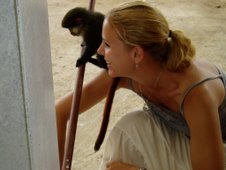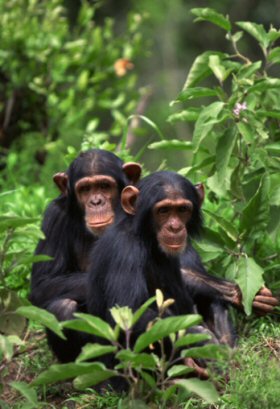I thought everyone might be interested to know what a typical day is like for me here. The days begin at 5:20am when I get up, get dressed, eat breakfast (toast and jam), feed the kitten (will explain later) and make lunch. At 6:45am Crista, Kelly and I head out the door knowing it will be about 12 hours before we will return again. It takes about an hour to get to work, traveling by 2 modes of transportation. We first walk down our hilly driveway, which is quite long and not shaded in any way. It is usually here that we begin to feel the horrendous heat of the day already taking over; however, there have been many mornings lately where you can already feel the immense pressure from the heat while you are sitting and eating breakfast before you have exerted any physical energy. Upon reaching the end of the driveway we begin looking for boda boda drivers which we take to get to our second mode of transportation. A boda boda is a bicycle with a padded seat on the back. The driver pedals you and himself kind of like those child seats that can be fastened to the back of bicycles, only not as secure, there are no backs to the padded seats we ride on. It can be tricky at times to get used to balancing yourself. Especially when your driver wants to race with his friends as cars are coming head on towards you at 90 mph and you have no control because you’re not the driver of the bike and you don’t know much Swahili, as most of the boda boda drivers do not know a lot of English. We take these boda bodas approximately 4-5 kilometers where we then get off and board a matatu, which is a van that acts as an above ground subway in a sense.
Riding a matatu is an experience in and of itself. There is a driver and a conductor. The conductor is responsible for flagging down people who want or need a ride, for collecting the payments from everyone for the rides and for helping people to load large or heavy items they may be traveling with. The conductor’s job appears quite difficult to me, as there are no official stops to board or debark the matatus. One can get on and off anywhere they like, and often there are many people that just stand on the sides of the roads talking or hanging out, so it can be difficult to decipher who needs a ride and who’s just mulling around. In addition there are different prices for the ride depending on where one boards and where one gets off, and they pack these matatus full of people. There are 14 seats on the matatu, but often they will cram 20+ people into these vans. You are basically sitting on top of one another at this point, and the conductor has to keep track of who’s paid, where they got on and where they are getting off so he charges them correctly. These conductors do this job with ease and even manage to haggle us almost every time, trying to charge us 10 shillings more than it actually costs for the ride, even though Crista has been going to the ruins where we work every day for 8 months and they know her, they still try to charge us the Mzungu rate because they think we don’t know any better like the tourists in the area. Let me say though that fighting with the matatu drivers for the correct change gets to be one of the things I dread the most each day because it takes so much out of you, especially at the end of the day. We take the matatu another 7 kilometers where we debark and then walk our last kilometer to work.
By the way, Mzungu means white person in Swahili. Mzungu is yelled at us almost anywhere we go, and it’s funny because we would never dream of yelling out the color of someone’s skin to them in America, but here it is not meant in a derogatory way, it is just meant more as a way to let us and everyone else know they notice us.
Once we arrive at work it is often another 20-30 minutes before we are even through the gates of the ruins. This is because there are usually 8-10 guys who work at the ruins lounging around the gates chatting and waiting to begin work. Let me explain, the field site we work at is actually a tourist site that is part of the National Museums of Kenya. Many tourists visit the site everyday to see the ancient Arab ruins that are preserved throughout the forest. A Muslim city used to inhabit the forest in 1399 AD, where they had constructed huge stone mosques and buildings, including a palace for the King and his family.
Getting through the gate takes so long because we must greet all of the guys and chat a bit. Now greeting here is not like in the states where you just say hi and then move on. Here greetings can take 5 minutes or more. You ask how the other is doing, how yesterday was, how today is so far, how the family is, ect… and they ask all the same of you. After we get past the greetings there is often some Swahili teaching, until finally Crista, Kelly and I have to say ok we will see you all later, breaking the conversation cycle so we might actually get some work done. Some days this is fun and I really enjoy it, as everyone that works at Gede ruins is very nice, but some days you just want to slip out because you are tired, aren’t feeling well or are just having a bad day, however just quietly slipping out is never an option. The same greetings have to be exchanged every time we pass through the gates. If we want to go out for lunch we know it will be at least a 2 hour lunch to account for the greetings on the way out, the time to walk there, eat and then the greetings on the way back in. And then of course when we leave at night these same greetings are exchanged again, even if they’ve already been done 3 times previously in the day. It is just part of their culture to greet in this manner and it is considered very rude if you pass someone you know and do not greet them.
After finally passing through the gates we walk to our office and settle in. We then rest for a few minutes outside the office because it is way too hot in the office, where we gear up for the long day ahead. Typically we will spend 4-5 hours in the field in the morning and then take an hour to 2 hour break for lunch. Most days we pack a lunch, which for me usually consists of a sandwich, some biscuits and a banana, however we occasionally go out for lunch. After lunch we return to the field for another 4 hours before packing up and going home. Our trip home is the same as in the morning, though in the reverse order. We have to say goodbye to everyone that works at the ruins on our way out, walk a kilometer to the matatu stage, take to matatu to the boda boda stage, take a boda boda to the end of our driveway and then walk up the driveway to Mwamba, the field house we live at. Usually we arrive back at home around 6:30pm.
After reaching home I shower, rinsing away all the sweat and dirt from the day that has piled on. My whole body feels like it is covered in layers of sweat, dirt and oil that can be peeled away. Dinner is served at the field house at 7:00pm, so usually right after cleaning up and straightening up my room I go for dinner, which is served family style. Dinner typically consists of either a rice dish or a potato dish, some kind of beans, a cooked vegetable dish and salad and for dessert is fresh fruit (papaya, mango, pineapple, oranges or watermelon), the best nights are when you get fruit salad which contains all these fruits. After dinner we clean up, everyone helps to wash, rinse and dry all the dishes and then we either watch a DVD, write emails, read or sleep. I have been exhausted ever since I got hear, and with the long, hard days of work, I often find myself going to bed around 9 or 10pm. And soon the day begins all over again.
I do get 2 days off a week, but they can never be 2 consecutive days. This is because there is only one research assistant working with each group right now, and Steffen, the principle investigator, feels that if we miss 2 days of work in a row we might miss something big, like a new birth, the disappearance of a monkey, the overthrow of the male in the group or an terrible fight that lead to a serious wound, etc… There are several things I do on my days off, and often many of them are chores or errands, so I never feel like a truly have a day of rest. I will do laundry, every day I have off. After that I will do a combination of trying to get to email, swim, go shopping for groceries or other items I need or go into the larger town, Malindi. I also will spend time reading, sleeping and watching DVDs. I have today off and am in Malindi doing email, shopping some, looking for kitten food and later I will be going to look at an apartment. I am trying to move out of the field house soon into a cheaper place and a place that will allow me to keep my new kitten…please see my next blog for this story.
Wednesday, March 21, 2007
Subscribe to:
Post Comments (Atom)


1 comment:
THANK YOU for a wonderful update - I felt I was right there with you! You are as always my hero!!!!!
Mom
Post a Comment